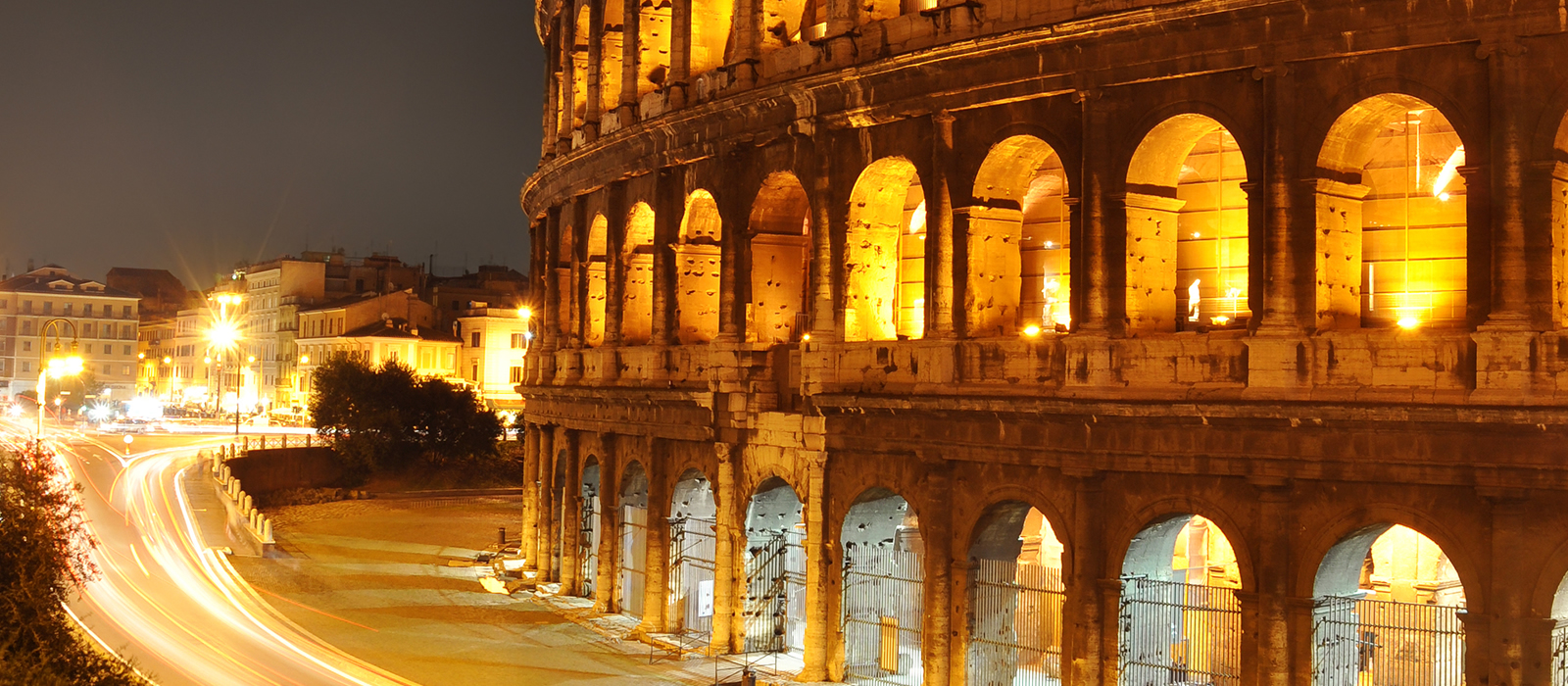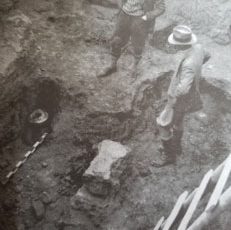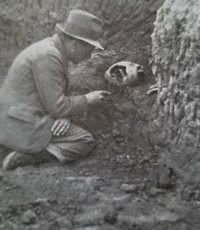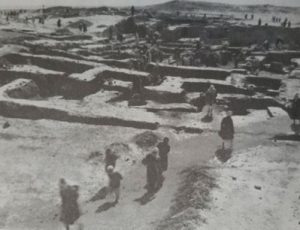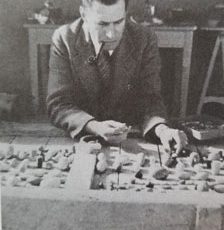- Athens is half way between Ottawa and Bangkok
- A Summer in Greece by Charlotte Rahme
- Joy’s Bookcase
- Josh’s Corner by Josh Beer
- Our Poet’s Corner
- Donations
- A Final Word of Thanks
Marianne Goodfellow
Editor, FGRS Newsletter
Athens is half way between Ottawa and Bangkok
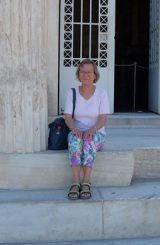
Marianne Goodfellow
Dear Friends,
In October 2019 by a wonderful orchestration of people and planes, I found myself in Athens with my husband and all my children for a short week together. (We had discovered while figuring out how we might see one another that Athens is just about half-way between Ottawa / Toronto and Bangkok where one of my sons lives.) In those few days we managed so see and do many things. One of the first was a day-long walking food tour in the Plaka which was so interesting and so much fun. We made a day trip to Delphi which left my daughter in tears, and another day trip to Aegina and the lovely temple of Aphaia. But otherwise we were drawn towards the Acropolis, up the street to the Tower of the Winds, which is such a wonderful place, and then around the corner to Hadrian’s Library which is home to at least 12 tortoises (by my daughter’s count).
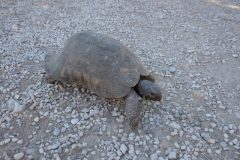
One of Hadrian’s tortoises
It is true that the Acropolis dominates Athens; you cannot escape it even if you wanted to. On our second night we found a restaurant in the Plaka beneath the Erechtheion. It was a lovely setting but Mary Chubb writes far more lyrically than I ever could about such an evening in Athens:
Quite near where we were sitting…the great rock, golden-crested with its splendid fragments, towered up into the last of the evening light. Just as when one looks wherever one happens to find oneself in Athens, for a glimpse of the Parthenon, and never fails to find it, whether sailing against the slow clouds or becalmed in a still blue sky, so the modern ways of Athens never seem to obscure or smother beyond recapture the feeling of continuity with her ancient glory.
(City in the Sand, p. 4, reviewed later in this newsletter)
I have just finished reading a book about the “Rock”, as the Acropolis is known to Athenians today. It is not your usual tourist book or academic or archaeological treatise but something quite unique, quite special. On the Rock. The Acropolis Interviews (2019) is the result of Allyson Vieira’s discovery, as it were, of the Acropolis and the long-standing work of the stone masons, architects, and engineers but especially the stone masons. They are the Greek marble workers who we may even consider the descendants of those who built the original Parthenon. Allyson, a sculptor herself, interviewed about fifteen marble masons and has found a way for us to read the very personal testimonies of the workers, their training, the details of the painstaking restoration work itself over more than thirty years. These are the people whom you may have seen yourself up on the scaffolding or among the column drums when you last walked on the Rock. I have never read anything quite like this.
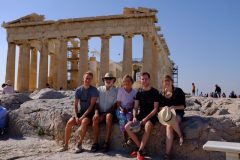
Family photo in front of the Parthenon
It was a lovely week in Athens and we all brought home various souvenirs as has always been the custom of travelers since Antiquity. But now I would like to ask two of my students to tell you of their travels in ancient lands, first Charlotte in Greece for two months, and then by virtue of a wonderful book, Melanie’s review of City in the Sand which I just quoted.
A Summer in Greece by Charlotte Rahme
An Archaeology Student’s First Dig at Argilos, Greece
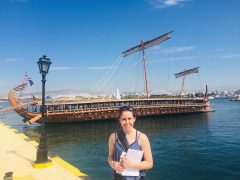
Charlotte Rahme
This past summer I had the privilege of living out one of my dreams of visiting Greece. For as long as I can remember, traveling throughout Greece was my ideal adventure. Growing up my longing to see this country and to learn more about it guided me to become the Greek and Roman studies student that I am today. After instinctively taking an archaeology course, I fell in love with archaeology and was even more determined to leave Canada and explore this country and field that I had become enamored with.
In May and June of 2019 all of my dreaming and planning had finally brought me to Greece. I enrolled in a travel history course with Carleton University and in the month of May traveled throughout the mainland. Finally I got to see the places and sites I had learned about: Athens, Thebes, Delphi, Corinth, Sparta, Epidaurus, Pylos, and more! I stood in front of the monuments, of the artifacts, the history itself – and I cried from joy on more than one occasion. Then in June, I made my way to Asprovalta, a small Greek city near Thessaloniki. There I spent four weeks working on an archaeological dig site, a truly rewarding and life changing experience that only traveling abroad could have given me.
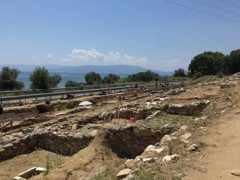
Dig site
Working on the dig site was a spectacular experience. It was exhausting, hard work, but also thrilling and incredibly fun. With the balance of work, traveling, and social outings, being at Argilos was one of the best aspects of my university experience.
Argilos
Argilos, an ancient Greek colony and trading hub, was occupied from the archaic to the Hellenistic period. This colony on the Thracian coast had varying levels of occupation until it was abandoned when Philip of Macedon took control of the area. The site has been excavated for many years, some of the major finds being long cobble stone roads and a series of early shops.
This year the students participating in the dig such as myself further excavated a series of shops near this cobble stone road. The students were split up into teams, where in groups of four we excavated one shop. Three girls and myself were assigned Lot Four, a shop which had a large press. We worked there for four weeks, both on site and in the museum; digging, documenting, and cleaning and cataloguing the materials we found.
Responsibilities on the Site
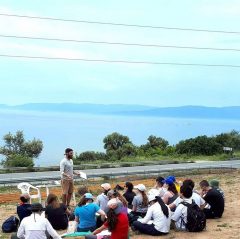 At the dig site and in the museum, students worked under the supervision of Teacher Assistants who helped guide us and show us how to accomplish tasks. Although these supervisors were present, students were responsible for learning and doing all aspects of the work.
At the dig site and in the museum, students worked under the supervision of Teacher Assistants who helped guide us and show us how to accomplish tasks. Although these supervisors were present, students were responsible for learning and doing all aspects of the work.
For the first couple of days, we had to open the site, which meant clearing vegetation, sweeping up loose dirt, and taking measurements, elevations, and triangulations of the shop we would be excavating. This work is hard labour and can be tedious, but it’s crucial it is done properly to ensure we have proper data recorded and a clear lot before we begin digging.
When we did begin digging, it was like a dream! With Trowels in hand we would dig back layer after layer of soil, ensuring to keep detailed records of soil colour and any finds we made. Finding an artifact is definitely the most thrilling and rewarding part of this experience. Whether revealing a piece of pottery, bone, or a bronze coin if you’re lucky, discovering an artifact is exciting and gratifying for the entire team. Uncovering and handling an ancient artifact was beyond my expectations!
When we needed to dig deeper, we would use pick axes, and sometimes shovels, all while ensuring we were keeping highly detailed on-site records. Digging is destructive. So these on-site records ensured that despite the destruction, we kept the provenience of artifacts, measurements, and other qualitative details that could be useful in the future.
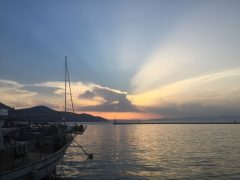 Not all the tasks we did were what one can call “glamorous,” but they were still very important contributions to the dig site. These tasks included setting up tools, sweeping, and clearing out buckets and wheel barrels of dirt. Doing these tasks and digging in our trench was highly physical and could easily feel taxing on the body. On the beach the high temperatures in Greece were welcomed, but on the dig site in over 30 degrees Celsius, the heat could get suffocating. However, the physicality of the work is part of archaeology! As long as one keeps hydrated and dresses appropriately, the heat is easily handled. Of course archaeology is hard work, but this makes it even more rewarding!
Not all the tasks we did were what one can call “glamorous,” but they were still very important contributions to the dig site. These tasks included setting up tools, sweeping, and clearing out buckets and wheel barrels of dirt. Doing these tasks and digging in our trench was highly physical and could easily feel taxing on the body. On the beach the high temperatures in Greece were welcomed, but on the dig site in over 30 degrees Celsius, the heat could get suffocating. However, the physicality of the work is part of archaeology! As long as one keeps hydrated and dresses appropriately, the heat is easily handled. Of course archaeology is hard work, but this makes it even more rewarding!
Life in Asprovalta
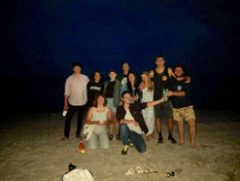 Even though archaeology is hard work, we students still had lots of fun! During the four weeks, we lived in Asprovalta which was a smaller Greek city near Thesaloniki. This was a beautiful location with various restaurants, bars, and shops. All of the students lived in one of three apartment buildings, each being around a five minute walk to the beach and restaurants.
Even though archaeology is hard work, we students still had lots of fun! During the four weeks, we lived in Asprovalta which was a smaller Greek city near Thesaloniki. This was a beautiful location with various restaurants, bars, and shops. All of the students lived in one of three apartment buildings, each being around a five minute walk to the beach and restaurants.
After working at the site, we would spend siesta time either napping in our rooms, quietly enjoying the courtyards, or going to the beach. Beyond this, there were scheduled trips to sites, museums, and even to Thesaloniki and the island Thasos. On top of all of this, the entire time you are working, eating, and celebrating with some of your closest friends!
Joy’s Bookcase
Book Review of Mary Chubb’s City in the Sand by Melanie Price
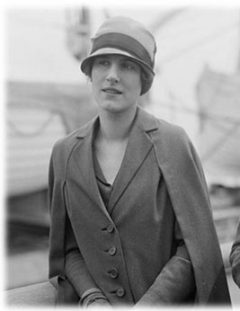
Mary Chubb
I took the introduction to archaeology courses in 2018-19 taught by Marianne Goodfellow. Through this class, I was introduced to many incredible books and authors, and in my reading I found an extreme admiration for Mary Chubb. She was born in 1903 and passed away in 2003, having lived a long and very interesting life. I read her first book Nefertiti Lived Here and instantly was intrigued by her writing style and story that brought her into the archaeological world. She was a member of John Pendlebury’s team in 1930 at Tell el Amarna in Egypt, her first experience of work on an excavation. (The story of Pendlebury on the island of Crete in the Second World War is told by Dilys Powell in The Villa Ariadne. Mary talks of his death in the Epilogue to Nefertiti Lived Here.) After reading her first book, I found her other less known but equally amazing book City in the Sand. This book gave me an appreciation for the archaeological world and the careers of people within it.
In City in the Sand, Mary wrote a joyous, moving, beautiful account of her time in Mesopotamia. A “secretary” and all-around general assistant, she describes the excavations of Ur and Eshnunna (modern Tell Asmar) in Iraq in the 1930’s. Working alongside famous archaeologists such as Henri “Hans” Frankfort and Thorkild Jacobsen among others, Mary writes a very personal account of uncovering such an historical site. Her excitement for the finds and her curiosity pours off the pages as you read:
There was something particularly appealing to me in that dusty little hoard in the pot. It was the human touch again, a voice speaking down the ages, which I only heard when I saw and felt the small personal belongings of the ancient ones. This lapis lazuli seal had been turned, hour after hour, in a warm brown hand, while the patient tool etched and scraped and dug into its surface. This borer had once bitten down into the heart of the seal, whirling round under the same clever fingers that had been at rest now for 4000 years. (City in the Sand, page 101)
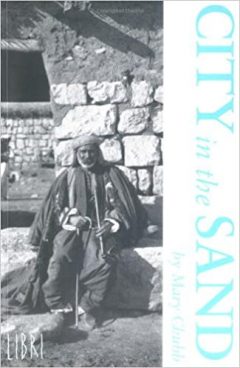 Her gift for expressive description really gives way to how her deepening knowledge of ancient history develops throughout the book. You can feel the meaningful connections she makes with others on the excavation and the site itself throughout, and you are captivated right till the end. Mary discovered by chance the life of an archaeologist but an unfortunate bike accident soon left her unable to work in physically demanding places. (Upon returning to England after World War 2, she lost her leg in a collision with an army vehicle.) Mary then turned to writing about her experiences and the people and places she very much loved.
Her gift for expressive description really gives way to how her deepening knowledge of ancient history develops throughout the book. You can feel the meaningful connections she makes with others on the excavation and the site itself throughout, and you are captivated right till the end. Mary discovered by chance the life of an archaeologist but an unfortunate bike accident soon left her unable to work in physically demanding places. (Upon returning to England after World War 2, she lost her leg in a collision with an army vehicle.) Mary then turned to writing about her experiences and the people and places she very much loved.
Many interesting women in archaeology have written about their work and Mary’s incredible stories are among those that we can read and learn from. Clare Goff (An Archaeologist in the Making), Gertrude Bell (Desert Queen), and Hilda Petrie (Letters from the Desert) are women of archaeology who present a background through literature and correspondence into such a challenging and fascinating field of work. There is no shortage of biographical and autobiographical literature that gives insight into the world of archaeology; we just need to pick the books up and read them! Mary herself encourages us to do so:
My hope that this book succeeds in passing onto its readers something of what my tenuous link with archaeology has meant to me – its frequent ups, its occasional downs – and, above all, its undeniable fun. (City in the Sand, page 213)
If you are looking for a book that brings joy, adventure and a different perspective of an archaeological dig then Mary Chubb’s City in the Sand is for you. You will feel the sand blowing against your face and the excitement of discoveries being made.
Image Gallery
Here are some other books that may be of interest:
- The Towers of Trebizond by Rose Macaulay, author of Pleasure of Ruins
I read the first line: “Take My camel, dear,” said my aunt Dot, as she climbed down from this animal on her return from High Mass.” – And I bought the book. This is a novel but also a story of travel through ancient landscapes. Mention of Sidon and Tyre, and “Jerash emerging in Corinthian splendour from its rocky hill” (p. 190), and the caravans heading to “Petra and Palmyra and Baalbek” (p. 211) remind me of Roloff Beny’s photographs in Pleasure of Ruins.
- The Shadow of Vesuvius. A Life of Pliny by Daisy Dunn (2019)
This new book about both Pliny the Younger and the Elder is on my summer reading list.
- Greek Mythology. A Traveler’s Guide from Mount Olympus to Troy (2016) and Roman Mythology. A Traveler’s Guide from Troy to Tivoli (2019)
both by David Stuttard and published by Thames & Hudson. (thank you to John Gahan for these titles)
- On the Rock. The Acropolis Interviews by Allyson Vieira (2019)
This book published by Soberscove Press in Chicago is bilingual; the English text is followed by a Greek translation printed on Mediterranean blue paper. (The photographs accompany only the English text.)
Josh’s Corner by Josh Beer
In Memoriam: Diane Wilson (23 February, 1947 – 24 October, 2019)
It was with much sadness that I recently learned of the death of Diane Wilson. Diane was one of the first students I taught when I came to Carleton as a lecturer in 1966. She was in a combined third and fourth year course on the Greek historians. I was told by the Classics chair, Ellenor Swallow, that Diane had only taken two years of ancient Greek and might need some extra help. In those days the Classics program was primarily a language one with just a few classical civilization courses to provide background. Many students came to Carleton with 4 or 5 years of Latin at high school and began reading unmodified Latin texts in their first year. As they were expected to reach a similar standard of expertise in Greek as in Latin by graduation, they completed the whole of Crosby and Schaeffer in their 1st year and were reading Euripides’ Medea by their 2nd. Those were the days!
There were four students in the historians course, all 4th year, except Diane: Earl Docherty was an expert on the topography of famous Greek battles and brought his own maps to class; Winnie Frome had transferred for a year to Carleton from the University of Alberta; and Jacques Perret had had a sound classical education at high school. The class took place in a small room on the third floor of the library; a fourth floor was still under construction, but there was no back extension to the library. Also, at the time there was no Dunton Tower and no Loeb Building, and the Arts and Science Faculties were both crammed together in Paterson Hall. I therefore shared an office with the ever affable but redoubtable Terry Robinson, and Diane would regularly appear at our door in my office hours to go over some of the Greek she had found difficult. Thucydides speeches especially can be very challenging. Although she lacked a certain confidence because she had less Greek than the others, she had what I would call a steely determination.
After she graduated in 1968, as is customary with most students unless the goddess Fortuna intervenes, I heard no more from her – that is until 2008. In the meantime, she had taken a teaching diploma at Queen’s, followed by supply teaching in Ottawa before working for Canada Post, the Federal Customs and Excise Department and the Treasury Board. She was introduced to her husband -to-be, Ron Tremblett, on a golf course in 1984 and they began living together in 1987. Diane played classical piano and had achieved grade 10 piano from the Royal Conservatory. She also began to enjoy travelling abroad and went to Russia and Egypt among other places
In 2008 Shane Hawkins, who at the time, I think, was the Greek and Roman Studies student adviser, appeared at my door and said “I have someone in my office, a Diane Wilson, who says that you taught her some years ago. Do you remember her?” I did indeed and so 40 Years On, the title of a famous play in the UK by Alan Bennett, Diane and I renewed our acquaintance. Although she said that her Greek was a little rusty, now that she had retired, she would like to read some again. She audited my 3rd year class on Plato’s Apology, but kept up with the work as diligently as any student enrolled for credit. Occasionally she would say to me after class that some of the students seemed not to have a good grasp of English grammar. Of course the study of English grammar was no longer a formal part of high school education as it had been in Diane’s school days. She also audited a couple of other classes of mine and became a regular attender of the annual, dramatic readings of Greek tragedy I directed from 2002-2014.
I had known for some time that Diane had ongoing health problems and I would phone her once or twice a year to ask how she was. She and Ron lived in Carp. I was in Europe in October last year when she died, and it was only with one of my infrequent phone calls in January that I heard the sad news from Ron. He had nursed her for many months in her last illness and, I know, was a great comfort to her. Diane had a sister Beverly to whom she was very close but who predeceased her. To Ron I offer our profound condolences.
Publication Notice
My latest publication is entitled: “Tradition and Ambiguity: Heroic Action and Deceit in Lines 1-85 of Sophocles’ Electra.” Mouseion Volume 17, 2020 Supplement 1. pp.57-75.
Resume of the Article:
The pre-Sophoclean mythical tradition about Orestes and his revenge for his father’s murder is ambiguous. On one hand, he is presented as winning fame as a warrior, and his revenge as a heroic act. On the other, the revenge is treated as more morally dark, particularly when Orestes uses guile to commit matricide. In ll. 1-85 of the prologue of Electra, Sophocles plays on this ambiguity to frame his handling of the plot and to show how heroic action stands in opposition to deceit as a vehicle of revenge.
Beer’s Blog, Joshua Now and Then

Josh Beer
I have never regarded myself as particularly eccentric, though this may cause laughter in some quarters. To adapt the words of the Eartha Kitt song: “I’m just an old fashioned guy with an old fashioned mind/Not sophisticated, I’m the sweet and simple kind”. I must confess however that, as the Grim Reaper gets ever closer, I am becoming a tad more eccentric, so almost every time I am greeted in a shop and asked in the formulaic manner by the server: “And how are we today?”, I react instinctively a bit like a Pavlovian dog, if it could but speak, by saying: “Getting Old” and sometimes adding, “and older than I was yesterday.” This Pavlovian response draws a smile or laugh or one of two responses: “Aren’t we all?” or “I know what you mean.” The trouble is that most people don’t know what I mean, because usually they are less than half my age. Deciding the other day I must give up replying in this silly Pavlovian manner, when the young server in Shopper’s Drug Mart came out with the formulaic question, I answered: “I’ve just taken up a new career.” “Oh, what’s that?” I put my walking stick on the counter and replied “I’m making war on old age.” She giggled. “Oh, I love that; you’ve made my day.” I can see lots of possibilities in this new career. I might even accompany this reply with a swivel or a few steps of dancing. I could even contact one of my former Greek students, Lionel Doonan, who has become a professional ballroom dancer, to give me a few refresher lessons. Moreover, if they decide to do a remake of the 1965 film of Zorba The Greek, I might even try to get an audition as Zorba. After all, I would do anything – well almost anything – to get a free trip to Greece. At any rate certainly gone are the days when I cleared the dance-floor at the Royal York Hotel at the CBC Christmas Party in 1965. If I can recall matters clearly, I was inspired by Dionysus and was trying to prove Nietzsche’s theory about the birth of tragedy out of the spirit of music.
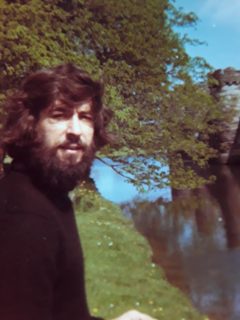 The benefits of retirement can be considerable. I have more time to read and write and travel. I am publishing more than I did while I was teaching and am working on several articles, the last of which I gave as a paper at the CAC meeting at McMaster in May on “The Art of the Con and Sophoclean Tragedy”. I occasionally give dramatic readings from Homer’s Iliad and Odyssey at different venues though I’ve never been asked to do one at Carleton, so I’ve recently joined The Arts and Letters Club in Toronto in order to try to spread my wings. I am still a co-Chair of The Ottawa Society for The Arts and Sciences which I founded as a retirement project in 2011. On Facebook I am slowly writing some childhood memoirs about the wound I received in 1944 because of Hitler’s nasty war. These are turning into a bit of a shaggy dog story.
The benefits of retirement can be considerable. I have more time to read and write and travel. I am publishing more than I did while I was teaching and am working on several articles, the last of which I gave as a paper at the CAC meeting at McMaster in May on “The Art of the Con and Sophoclean Tragedy”. I occasionally give dramatic readings from Homer’s Iliad and Odyssey at different venues though I’ve never been asked to do one at Carleton, so I’ve recently joined The Arts and Letters Club in Toronto in order to try to spread my wings. I am still a co-Chair of The Ottawa Society for The Arts and Sciences which I founded as a retirement project in 2011. On Facebook I am slowly writing some childhood memoirs about the wound I received in 1944 because of Hitler’s nasty war. These are turning into a bit of a shaggy dog story.
Since my academic work made me spend more time in Greece than Italy, The Angel Catherine and I are taking a cruise from Venice to Rome this November. Although I’ve been to Italy, I’m ashamed to say I’ve never been to Rome, but as the late American novelist, essayist, scriptwriter – cum satirist – cum cynic – Gore Vidal replied, when asked why he had abandoned his native land to take up residence in Rome : “From what better vantage point, he asks, can one observe the decline and fall of civilization?” In our age, when we have the quack, quack, quack in the White House and the brekeke-kex koak-koak koak from the Palace of Westminster in Brexitland, Vidal’s riposte seems all the more timely.
Of course, the disadvantages of old age are palpable. Touch wood, my health has held up so far, though my girth, while not yet quite reaching Falstaffian proportions, needs constantly to be reined in like a recalcitrant child. In 1973 on my first sabbatical, I bought a wonderful leather belt, which I still possess, in the flea market at Athens. Alas, dear friends, I can no longer wear it but keep it out of nostalgia. Last year, in the Plaka at Athens, I had to buy a much larger one of lesser quality which, to my horror, is 7 inches longer. O Tempora! O Mores!
I am writing this little piece on the Sunday of Thanksgiving, a holiday I don’t recall ever having really celebrated since, whatever family I did once have or now have left, live thousands of miles away. I did not grow up with Thanksgiving, which is a New World festival. Clearly as a young man I had not given enough forethought to the future by seeing the benefits of spawning a large progeny to attend me in old age, and so it was only last year I became a grandfather for the first time. Because my son Barnaby often calls me pops, I became a grandpops and decided to take the opportunity, at Josie’s baptism in the UK, to have myself re-Christened: Dom Perignon after the grandpops of the great champagne. Do please feel free to address me in future as The Dom. Even better, if your budget should allow, offer to crack open a bottle with me. I can assure you it will be money well spent.
Isolation and loneliness, in addition to health, are, of course, the great terrors of the elderly. I therefore organize, on a fairly regular basis, soirees at which at least half the guests have to be less than half my own age. My idea of hell on earth would be not having access to young, intelligent people, and sitting around with a lot of old folks, saying; “They didn’t do things like that in our day”. But one does become more isolated. I have not taught a course at Carleton since December 2015 nor directed students in a Greek tragedy reading since 2014. In the first instance, I could not keep abreast with the new technology, when students asked that the lecture notes be put online. Since I used to adlib all beginning Greek classes with just the text in front of me, I would not know what to put online let alone how to do it. In fact, the most sophisticated piece of technology I used to use was a piece of chalk; “They did things like that in my day”. The play readings were a different matter. It became too much of a hassle, going to Carleton on the unreliable OC Transpo in the afternoon rush hour and winter weather and, then, occasionally finding actors not showing up for rehearsals. “Stop complaining, Josh! You are beginning to sound like a grumpy old man.”
Since I did miss teaching, I thought I might try giving a course for the Learning in Retirement Program. One just has to turn up, give lectures without any bureaucracy and without having to do any marking. I thought I had a couple of fairly engaging topics to offer “Women and Greek Tragedy” and “Theatre and Democracy in Ancient Athens”. To my surprise I was asked to present myself for an interview before two young ladies. Discretion forbids me from guessing their ages. I thought things were going reasonably well, but suddenly I decided to pull out of a bag my teddy bear, Sebastian. Although I had thought that this might jolly things along by helping them relax, on reflection I think it was a mistake of strategic dimensions, since I failed to be hired. On the appearance of Sebastian, one could almost feel their looks change: “Who is the lunatic we’ve got here?” Sebastian is a rescue bear from a garage in the UK where he had been locked up for 8 years. I either had to have him put down or bring him over as a refugee to Canada. His immigration status is pending. There is an Order in Council about him sitting on the Speaker’s desk in the Houses of Parliament, since I brought him into Canada without any papers or declaring him at customs.
As a result of all this I visit Carleton more and more rarely these days and know fewer and fewer people – there are some exceptions. The very halls of academe where I spent 50 years teaching are becoming “like another country. They do things differently there”. Some people, of course do dimly recognize me from somewhere, but they are not quite sure where. In these cases they usually think they should nod at me as if I were Wemmick’s deaf aged P. to whom Pip is told to nod every so often in Dickens’ Great Expectations because it makes the aged P. feel happy. Rather than nodding I think I personally would prefer to go back to the age of Jane Austen when people showed greater civility and bowed to one another. Then, when I bow as I make my final curtain call, I can use the very last words Samuel Beckett wrote in his original French version of Waiting for Godot: “C’est la vie!”.
October 13, 2019.
Our Poet’s Corner
Tale of a Trojan, C. Dunn. Feb. 2019
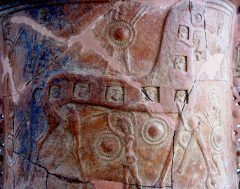
the earliest representation of the Horse on The Mykonos Vase (c. 675 BC)
I could have told them, but they never asked.
After ten long years the Greeks would not have left a true and noble gift outside our gates.
Yet there it stood,
four-legged timber beast of sturdy form.
I shivered at the sight and felt forewarned.
Amongst themselves they argued loud and long. Brandishing bronze spears, encouraging Laocoon and by his thrust the wooden giant groaned.
Its secrets held.
We should have pushed and dragged it to the ridge,
burst it in shattered gallop off the cliff!
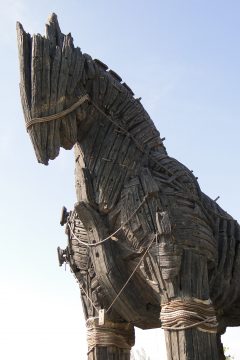
Replica of Trojan Horse, Turkey
Did hubris hide our Trojan common sense?
Could a cold and lifeless creature soothe our gods?
King Priam pleased and flattered by Sinon
drank up the lies.
Singing, dancing, pouring wine I crept away
convinced my trembling thoughts would hold no sway.
By night Greek ships slunk back from Tenedos while Sinon spilt warriors from that equine womb.
With my daughter I donned my cloak and ran, she must survive!
Behind us smoke rose up with choking ash.
I could have told them, but they never asked.
By Colleen Dunn
Donations
Donations to the Friends of Greek and Roman Studies are gratefully accepted and receipts will be issued. Donations are used for departmental events and honoraria. Thank you for your past contributions.
A Final Word of Thanks
I wish to thank Charlotte, Melanie, and Colleen for taking the time away from their classes and studies to give us their personal contributions to this Newsletter. Thank you to Josh as always for his contributions. The Newsletter, however, would not appear in this format, so nicely put together and arranged with pictures and links and special details without the computer expertise of Patricia Saravesi in the Dean’s Office and the organization and patience of Andrea McIntyre, our GRS administrator. I am once again very grateful to them both.
Marianne Goodfellow, Editor, FGRS Newsletter
